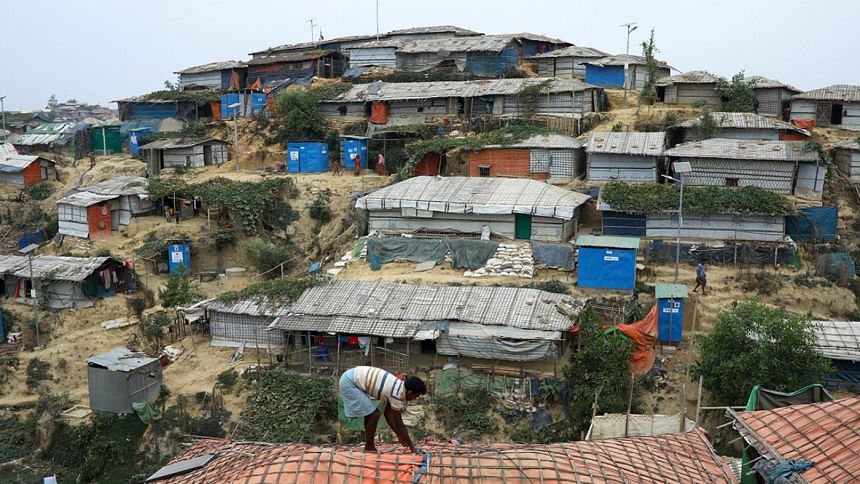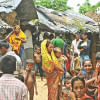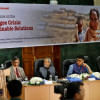Refugee Camps: Crime spikes while Rohingyas despair

With uncertainty shrouding the Rohingya repatriation, crimes -- from petty thefts to drug peddling, abduction to murder -- have become a commonplace at the refugee camps in Cox's Bazar.
Many of the Rohingyas, sheltered in Bangladesh, are now living in a state of panic. They blame unemployment in the camp and rivalry among their leaders for the situation there.
At least 31 people have been killed allegedly by fellow Rohingyas in the camps while many others abducted for ransom since August 2017 when the country saw the exodus of more than 700,000 Rohingyas, who fled atrocities in Myanmar.
In one of the latest incidents, a 35-year-old Rohingya man, Hamid Master, was killed over family feud a little over a month ago, said police. His body was found dumped into a septic tank.
Besides, on February 21, a group of Rohingyas attacked six people, including three German journalists, in Ukhia camp and snatched valuables from them, police said.
Since the exodus began, about 328 cases have been filed against 711 Rohingyas over various crimes, according to Cox's Bazar police.
In this situation, it is the common Rohingyas who are suffering the most.
Talking about the issue, ABM Masud Hossain, superintendent of police in the district, said, "The pattern of the crimes [in the camps] changes with time. Some troublemakers [among the Rohingyas] are now more into extortion and abduction."
"There are some small shops inside the camps and most clashes ensue when extortionists harass shop owners," he said.
Contacted, Refugee Relief and Repatriation Commission (RRRC) officials said based on information, the government has already started removing the shops, which are also believed to be the centre of various illegal activities, including yaba trade.
Meanwhile, camp sources, said two Rohingya groups -- led by two men named Nasrullah and Yunus -- clash frequently to establish dominance in the refugee settlements.
They are continuing the rivalry since their days in Myanmar, the sources said, without giving further details.
Apart from them, there are other feuding groups led by "majhis" (Rohingya leaders assigned to help 'maintain order' in the camps). Also, many clash to grab the posts deemed to have power, said the sources.
Many Rohingyas abducted and even murdered other Rohingyas over previous enmity. The abductees were kept in deep forests or remote hilly areas, according to locals, police and local administration.
SP Masud, however, stressed that the overall law and order situation in the Rohingya settlements was yet to reach a state to be described as "alarming".
RRRC officials said the uncertainty over the repatriation has left the Rohingyas in despair. In this situation, tensions were growing among nearly a million refugees and the host communities of Cox's Bazar, they said.
They said the Rohingyas are divided in opinion over the issue of repatriation; one group wants to return while the other wants to stay in the camps as they fear further persecution in Myanmar.
With no real progress made, many of them have become frustrated. At times, some of them become unruly said, RRRC Commissioner Abul Kalam.
Mohammad Noor, secretary of Kutupalong camp, pointed out unemployment and hopelessness over the repatriation as the reasons behind "resentments" brewing among some Rohingyas. "Some bad elements are creating chaos over petty issues every other day," he told this paper recently.
Abdus Salam, Inspector (acting) of the Department of Narcotics Control in Cox's Bazar, said, "A group involved in Yaba trading is quite organised and ruthless. They have their spies everywhere. As a result, common Rohingyas are too scared to speak up."
"So sometimes we struggle to bring them to book."
Cox's Bazar Deputy Commissioner Kamal Hossain claimed that the law and order situation was under control and law enforcement agencies were patrolling camp areas round-the-clock.
"We have taken various initiatives to boost up communication with the Rohingyas. We have set up solar lights in the area to prevent crimes as most of the incidents happen during nighttimes. So situation will improve soon," he said.

 For all latest news, follow The Daily Star's Google News channel.
For all latest news, follow The Daily Star's Google News channel. 








Comments